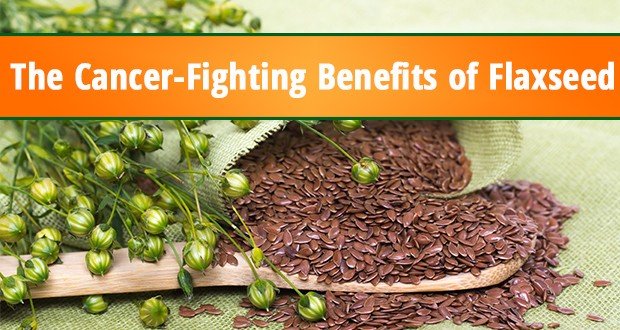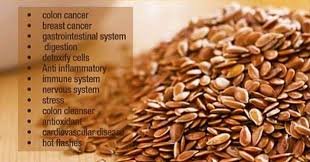
What is Flaxseed?
From the name, you can tell that it is the seed of the flax plant. Its fibers are woven to make linen fabric and the oil (referred to as linseed oil) is used in wood finishing.
Flaxseed sometimes imparts a mild, nutty essence when added to food but other ingredients easily overshadow the taste.

What Makes Flaxseed So Healthy?
Flaxseed has an amazing amount of nutrients and is the best source of plant-based omega-3 fatty acids. Omega-3 fats are healthy fats shown to reduce levels of cholesterol in your system. Other sources of omega-3s include fatty fish and walnuts. Flaxseed also contains nine amino acids that, when appearing together, make a complete protein like those found in dairy and meat.
Their high fiber content (approximately 3 grams per tablespoon), is hugely beneficial to your overall digestive health.
What Else Can Flaxseeds Do?
The benefits of flaxseed make it a superfood you need to add to your anti-cancer eating plan. Ongoing studies like the one at the University of Illinois show that these sesame seed-sized kernels may prevent serious illness.
Experts believe this is due to the phytochemicals and phytoestrogens as well as the omega-3 fatty acids contained within. These compounds working together provide a strong protective benefit to our bodies.

Top 3 Health Benefits of Flaxseed
- Protection against heart disease. The human body cannot produce omega-3 on its own and you must have an abundance of these valuable compounds for many critical functions. Consuming foods rich in omega-3 reduces the risk of developing cardiovascular issues. Some studies are working to prove that heart disease is reversible. Arterial plaque formation can be slowed and prevented by omega-3. Scientists are currently researching whether or not omega-3 can remove existing plaque buildup. Soluble fiber contained in flaxseed helps “scrub” the body clean of fat-soluble waste and toxic compounds that develop as a result of our body’s metabolic process. The incredible antioxidant properties found in lignans also assist by fighting against the free radicals that cause body-wide inflammation and cellular damage.
- Prevention of osteoporosis. Post-menopausal women are at the greatest risk for loss of minerals, density, and strength of their bones. Findings from a research study at the National Research Center in Cairo, Egypt, show that omega-3 fatty acids present in flaxseed protect the bones and prevent bone demineralization and loss of density.
- Cancer protection. Regular consumption of flaxseed may protect the body from colon cancer, prostate cancer, and breast cancer. Omega-3 fatty acids prevent cancerous cells from latching onto healthy cells. If cancerous tumors attempt to form, the lignans contained in flaxseed stop the formation of new blood supply (anti-angiogenesis) that feeds tumor growth. In other words, they starve the tumor of their supply of oxygen and nutrients. If cancer cells can’t get these basic requirements, they are unable to multiply and spread.
To achieve the most health benefit from flaxseed it is best to use freshly milled or crushed seeds. This allows your body to efficiently absorb the available nutrients contained within its tough exterior. The shell is where the fiber originates so make sure your seeds are milled or processed properly. Flaxseed oil capsules, available in most health food stores, may not provide the benefits you’re looking for. Processing removes the crucial lignans and unless they’re added back to the oil, you won’t get the full benefits of flaxseed.
By Ty Bollinger
https://thetruthaboutcancer.com/cancer-fighting-benefits-of-flaxseed/
Hi! I am a robot. I just upvoted you! I found similar content that readers might be interested in:
https://thetruthaboutcancer.com/cancer-fighting-benefits-of-flaxseed/
Flex seed is difficult to eat. How do you eat flax seed?
Try - Start your morning with a healthy dose of omega-3's by sprinkling over cold cereal or stirring it into hot cereal like oatmeal. Flax seeds add a slightly, but not overwhelming, nutty flavor. Add 1 tablespoon of whole flax seeds into your morning smoothie for an extra 2 grams of protein.